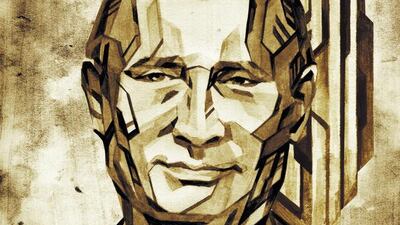Vladimir Putin likes to play top dog. During one of his first official trips to the US in the early 2000s, the Russian president is said to have met Barney, George W Bush’s Scotch terrier. Putin reportedly looked at Barney, then at Bush and scoffed: “You call it a dog?” A year later, when Bush visited Russia, Putin introduced him to his own dog, Koni, a hulking black Labrador. Bush recalled the episode in an interview earlier this year. “Out bounds this huge hound,” he said, “and Putin looks at me and says: ‘Bigger, stronger and faster than Barney.’”
Angela Merkel had to endure similar treatment. In 2007, Putin hosted the German chancellor at his residence in Sochi. As a pack of journalists filed into the room where the two leaders were seated, Putin summoned Koni to join them. Merkel, who is terrified of dogs, something that the Russian president and his staff must have known, turned to stone and watched, wearing an uncomfortable smile, as the dog sat at her feet. Putin, meanwhile, glowed.
See all our Year in Review coverage
If these episodes offered any insight about the former KGB agent's psyche, Merkel was on hand to articulate it. "I understand why he has to do this – to prove he's a man," she said of Putin, according to a recent New Yorker story. "He's afraid of his own weakness. Russia has nothing, no successful politics or economy. All they have is this."
Russia, of course, has a few things going on aside from Putin’s machismo. It has revanchist ambitions, a rusty but large military, nuclear weapons, plus lakes of oil and gas keeping much of Europe’s industry running.
All of this, for a while, gave western leaders enough reason to tolerate Putin’s boorish behaviour and his government’s flouting of international norms. This year, however, their patience, particularly Merkel’s, has worn thin.
The wake-up call came in the form of Russia’s invasion and annexation of Crimea, accompanied by its overt support for the separatist insurgency in eastern Ukraine. Although a handful of politicians, analysts and apologists argue that the coup that toppled Ukraine’s pro-Moscow president, Viktor Yanukovych, gave Putin no choice but to intervene in what he considers Russia’s sphere of influence, theirs is a minority view. The consensus in Europe and the US is that Russian troops have no business in Ukraine – and that Putin is making a travesty of international law.
In Europe, that consensus has been shaped largely by Merkel, who has helped strong-arm several reluctant governments into adopting tough sanctions against Russia.
Whether the sanctions will eventually compel Putin to back down in Ukraine remains anyone’s guess. So far at least, the West’s new-found resolve to contain Russia appears not to have dented Putin’s resolve to show the West who’s boss, at least in Ukraine.
If there is anything we have learnt about Putin in 2014, says Charles Grant, head of the London-based Centre for European Reform, “[it’s] that he’s even more paranoid about the West in general and America in particular than we previously assumed.
“He believes the West is out to get him and he believes that he is fighting to preserve Russia’s honour and his regime.”
To make things worse, says Grant, who has met Putin several times, the Russian leader appears to have grown increasingly complacent about the state of his country’s economy. “It’s become quite clear that he doesn’t really accept the western analysis of the Russian economy – that it needs to diversify, that it shouldn’t be so dependent on exports of natural resources, that it needs more foreign investment and that the rule of law needs improving,” he says. “He doesn’t seem to accept any of that. That’s worrying.”
Yet it is precisely on the economic front where Putin might have to fight his next battle. Judging by the economic figures coming out of Moscow, western sanctions are finally beginning to bite. The outlook remains bleak. With oil prices having fallen by more than 45 per cent since June, Russia faces its second recession in less than six years.
Piotr Zalewski is a freelance journalist based in Istanbul.

